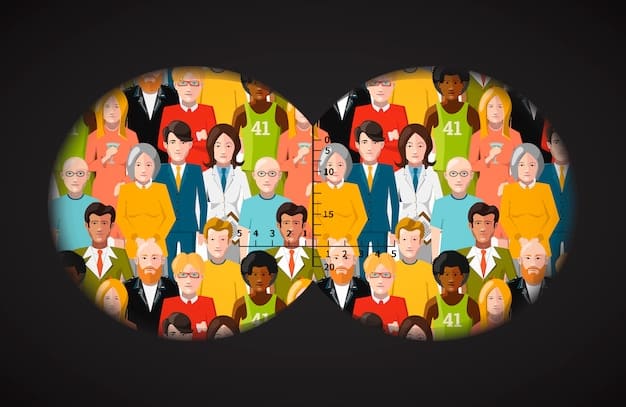Just-World Hypothesis & US Inequality: Attitudes Explained

The just-world hypothesis, a cognitive bias, significantly shapes perceptions of inequality in the US by leading individuals to believe that life’s outcomes are inherently fair, often resulting in victim-blaming and resistance to systemic change.
Ever wonder why some people attribute success solely to hard work and poverty to individual failings, even when confronted with stark evidence of systemic disparities? This persistent belief often stems from the just-world hypothesis, a fascinating psychological phenomenon that profoundly influences attitudes toward inequality in the US.
Understanding the Just-World Hypothesis
The just-world hypothesis is a cognitive bias where individuals believe that people get what they deserve. In essence, good things happen to good people, and bad things happen to bad people. This belief provides a sense of order and predictability in an often chaotic world, offering psychological comfort. When faced with evidence of suffering or misfortune, rather than acknowledging random chance or systemic failures, people may seek to rationalize it by attributing fault to the victim.
Origins and Core Tenets
The concept was primarily developed by social psychologist Melvin Lerner in the 1960s. Lerner’s research suggested that people have a deep-seated need to believe in a just world where actions have predictable and fair consequences. This belief helps maintain a sense of control and reduces anxiety about the possibility of suffering undeservedly. Without it, the world might seem frighteningly arbitrary.
Consider these core tenets of the hypothesis:
- Fairness Imperative: There’s an inherent human need to perceive the world as fundamentally fair and orderly.
- Attribution of Blame: To maintain this belief, individuals often attribute misfortune to the victim’s actions or character rather than external factors.
- Psychological Comfort: Believing in a just world offers a sense of security, suggesting that if one behaves justly, they will be rewarded and protected from harm.
This cognitive mechanism helps people cope with the unsettling reality of suffering and injustice, but it comes at a cost, particularly in how society views and addresses inequality. It can create a powerful internal resistance to acknowledging that some people face systemic disadvantages beyond their control. This often manifests as victim-blaming or a dismissal of societal issues in favor of individual responsibility narratives. We frequently observe this in public discourse when discussing poverty, crime, or health disparities, where systemic factors are often overlooked.
Psychological Mechanisms at Play
The just-world hypothesis isn’t merely a philosophical stance; it’s rooted in specific psychological processes that allow individuals to maintain this belief even when confronted with contradictory evidence. These mechanisms serve to protect one’s sense of order and control.
Cognitive Dissonance and Self-Protection
One primary mechanism is the reduction of cognitive dissonance. When individuals witness suffering or injustice that challenges their belief in a just world, they experience psychological discomfort. To alleviate this dissonance, they may rationalize the situation by blaming the victim, thereby preserving their belief system. This often means twisting or reinterpreting facts to fit a pre-existing notion of fairness.
For example, if someone believes effort equals reward, witnessing extreme poverty might create dissonance. To resolve this, they might conclude that the impoverished individual “didn’t work hard enough” or “made bad choices,” rather than questioning the societal structures that contribute to poverty. This is a powerful self-protective measure.
Attribution Theory and Fundamental Attribution Error
The just-world hypothesis is deeply intertwined with attribution theory, particularly the fundamental attribution error. This error describes the tendency to overemphasize internal, dispositional explanations for others’ behavior while underestimating external, situational factors. When applied to inequality, this means attributing an individual’s low socioeconomic status to their personal laziness or lack of intelligence, rather than acknowledging systemic barriers like inadequate education, discriminatory practices, or limited access to opportunities.
This bias allows individuals to maintain their belief in a just world because if poor people are poor due to their own failings, then the world remains fair; those who work hard succeed, and those who don’t, fail. This simplistic view absolves society of responsibility and reinforces the idea that outcomes are solely determined by individual merit. The implications of this are vast, influencing public policy and individual charitable behavior.
Impact on Perceptions of Economic Inequality
The just-world hypothesis plays a crucial role in shaping how Americans perceive and respond to mounting economic inequality. In a society that often champions individualism and meritocracy, this cognitive bias can either reinforce or challenge existing narratives about wealth and poverty.
Legitimizing Wealth and Blaming the Poor
In the US, there’s a strong cultural narrative that hard work leads to success and wealth. The just-world hypothesis fits seamlessly into this narrative, suggesting that those who are wealthy “deserve” their riches due to their efforts and intelligence. Conversely, it can lead to the stigmatization of those experiencing poverty. If the world is just, then poor individuals must somehow be responsible for their own misfortune, perhaps through laziness, poor decision-making, or a lack of ambition.
This perspective often ignores the significant structural barriers that prevent upward mobility, such as:
- Inherited Wealth: The advantages conferred by inherited wealth and privilege.
- Access to Education: Disparities in access to quality education.
- Healthcare Disparities: Limited access to affordable healthcare that impacts productivity.
- Systemic Discrimination: Ongoing effects of racial, gender, and other forms of discrimination in employment and housing.
Adopting a just-world view allows individuals to dismiss these systemic factors, reducing complex societal issues to simple questions of individual character. This makes it challenging to garner public support for policies aimed at redistributing wealth or providing safety nets, as these are often seen as unfair to “deserving” taxpayers or as enabling “undeserving” individuals.
This mindset can effectively legitimize existing socioeconomic hierarchies, making them appear as natural and fair rather than as the product of complicated historical and current political and economic forces. This is particularly prevalent in conservative leaning media and political discourse, where individual responsibility is heavily emphasized over collective or governmental interventions. This often polarizes the debate, making it harder to find common ground.

Influence on Social Justice Movements and Policy
The just-world hypothesis is not merely an academic concept; its real-world implications ripple through social justice movements and public policy debates, often influencing the speed and nature of change.
Resistance to Systemic Explanations
When social justice advocates highlight systemic issues like racial discrimination, gender wage gaps, or wealth inequality, they are often met with resistance rooted in the just-world hypothesis. If a person believes the world is inherently fair, then accusations of systemic injustice can be deeply unsettling. Rather than accepting that society itself might have flaws, it’s easier to attribute negative outcomes to individual choices or to dismiss the claims of injustice as overblown.
This resistance manifests in various ways:
- “Pull yourself up by your bootstraps” mentality: A belief that anyone can succeed if they just try hard enough, ignoring structural barriers.
- Dismissal of historical injustices: Arguing that past wrongs are no longer relevant to current disparities.
- Victim-blaming discourse: Shifting responsibility for oppression or misfortune onto the marginalized group itself.
This phenomenon makes it incredibly difficult to build consensus for policies that aim to dismantle systemic inequalities, such as affirmative action, reparations, or comprehensive social welfare programs. These policies often challenge the core tenet of the just-world belief, which suggests that outcomes are deserved. Consequently, initiatives aimed at addressing “root causes” rather than just symptoms often face significant opposition.
Shaping Public Support for Welfare and Affirmative Action
Consider public attitudes towards welfare programs. A just-world perspective can lead people to view welfare recipients as lazy or undeserving, believing they simply haven’t worked hard enough. This can erode public support for social safety nets, despite evidence that these programs are often critical for preventing extreme poverty and fostering economic stability.
Similarly, affirmative action policies, designed to address historical and ongoing discrimination, frequently draw heavy criticism rooted in just-world thinking. Opponents may argue that these policies give an “unfair” advantage to certain groups, thus violating the principle of meritocracy and a just world where positions are earned solely on individual merit. They believe that if the world were truly just, everyone would have an equal starting line, and therefore, any intervention is an unfair adjustment to this presumed natural order. This perspective makes it challenging to gain widespread acceptance for policies that explicitly acknowledge and attempt to correct past and present injustices.
Intersection with Political Ideology
The just-world hypothesis does not operate in a vacuum; it often intersects with and reinforces specific political ideologies, particularly in the US. Understanding these connections helps explain varying public responses to inequality.
Conservative vs. Liberal Perspectives
Generally, the just-world hypothesis aligns more closely with conservative political ideologies. Conservative thought often emphasizes individual responsibility, limited government intervention, and free-market principles. This framework easily accommodates the belief that success and failure are primarily outcomes of individual effort and choices, fitting neatly within a just-world narrative. From this standpoint, government welfare, progressive taxation, or affirmative action might be seen as interfering with the “natural” and “just” order of things, potentially rewarding the “undeserving” or penalizing the “deserving.”
Conversely, liberal ideologies tend to emphasize systemic factors, social responsibility, and the need for government intervention to address inequality. Liberals are more likely to acknowledge that external societal structures—like historical discrimination, lack of opportunity, or economic systems—play a significant role in determining life outcomes, thus challenging the core assumptions of a just world. This ideological divergence can lead to vastly different policy preferences and public attitudes towards issues such as:
- Wealth Redistribution: Support for higher taxes on the wealthy versus opposition based on earned income.
- Social Safety Nets: Belief in universal healthcare and robust unemployment benefits versus concerns about dependency.
- Racial and Gender Equity: Advocacy for equity initiatives versus arguments for a colorblind or gender-blind approach.
Implications for Political Polarization
The differing reliance on the just-world hypothesis contributes to political polarization in the US. When one side attributes inequality to individual failings and the other to systemic injustices, finding common ground for solutions becomes incredibly challenging. This fundamental disagreement on the causes of inequality leads to vastly different proposals for addressing it. The debate often devolves into moral arguments about who is “deserving” and who is “undeserving.”
This ideological divide is not just about policy; it’s about deeply held beliefs about how the world works and what constitutes fairness. When these core beliefs are challenged, individuals tend to entrench themselves further in their positions, making genuine dialogue and compromise difficult. Understanding this psychological underpinning is crucial for anyone trying to navigate or influence these complex political landscapes. It helps to explain why certain policy arguments resonate strongly with one group and fall flat with another.
Challenging the Just-World Narrative
While the just-world hypothesis is a deeply ingrained cognitive bias, it is not immutable. Various strategies can help individuals and societies move beyond this limiting perspective to foster a more nuanced understanding of inequality and promote equitable solutions.
Promoting Empathy and Perspective-Taking
One of the most effective ways to challenge the just-world hypothesis is by promoting empathy and perspective-taking. When individuals can genuinely imagine themselves in someone else’s shoes, particularly those experiencing hardship, it becomes much harder to attribute their struggles solely to personal failings. Narratives that highlight the lived experiences of marginalized communities, humanizing their struggles and revealing systemic obstacles, can be powerful tools.
Consider initiatives that:
- Personal Stories: Share personal stories of those affected by inequality, detailing specific challenges.
- Simulations: Engage people in simulations that illustrate systemic disadvantages, such as poverty simulations.
- Direct Interaction: Encourage direct interaction and dialogue between people from different socioeconomic backgrounds.
These approaches help break down the abstract nature of “the poor” or “the undeserving” and replace it with concrete, relatable human experiences. Empathy cultivates a shift from individualistic explanations to an acknowledgment of societal influences. When empathy is fostered, it becomes harder to maintain the belief that everyone gets what they deserve.
Education and Critical Thinking
Education is a critical long-term strategy for dismantling the just-world hypothesis. Teaching about the structural causes of inequality—such as historical oppression, economic policies, and social determinants of health—can provide individuals with a more comprehensive framework for understanding societal disparities. This involves moving beyond simplistic explanations to embrace the complexity of social systems.
Critical thinking skills allow individuals to question their own assumptions and biases, including the just-world hypothesis. This means encouraging people to:
- Question Assumptions: Be aware of their own cognitive biases.
- Analyze Data: Look at empirical evidence about socioeconomic mobility and systemic factors.
- Consider Multiple Perspectives: Actively seek out and evaluate different viewpoints on inequality.
By integrating social science research and historical context into public discourse and educational curricula, it’s possible to foster a more informed and less biased understanding of inequality. This shift, while gradual, is essential for building a society capable of addressing its deep-seated injustices effectively. Challenging this bias requires sustained effort and a willingness to confront uncomfortable truths about how society operates.

| Key Point | Brief Description |
|---|---|
| ⚖️ Just-World Hypothesis | The belief that people get what they deserve, maintaining psychological comfort by viewing the world as fair. |
| 🧠 Psychological Mechanisms | Driven by cognitive dissonance and the fundamental attribution error, leading to victim-blaming. |
| 💰 Economic Inequality Perceptions | Legitimizes wealth and blames the poor by ignoring systemic barriers to opportunity. |
| 🤝 Challenging the Narrative | Requires empathy, education, and critical thinking to foster a more nuanced understanding of inequality. |
Frequently Asked Questions
▼
The just-world hypothesis is a cognitive bias where individuals believe that the world is inherently fair, and people receive outcomes (rewards or punishments) that are consistent with their actions or character. This belief helps maintain a sense of order and predictability, reducing anxiety about undeserved suffering.
▼
To preserve the belief in a just world, individuals often rationalize misfortune by attributing blame to the victim. For instance, if someone is poor, a just-world believer might conclude they are poor due to personal failing rather than systemic issues, thereby maintaining their conviction that the world remains fair.
▼
The US cultural emphasis on individualism and meritocracy aligns well with the just-world hypothesis. This framework suggests success is earned and failure is self-imposed, making it easier to legitimize existing wealth disparities and resist acknowledging structural barriers that contribute to inequality.
▼
Yes, significantly. The just-world hypothesis makes it difficult for individuals to accept systemic explanations for inequality, often leading to resistance against policies like welfare or affirmative action. It promotes a focus on individual responsibility rather than collective or governmental solutions for societal problems.
▼
Challenging this hypothesis requires promoting empathy through personal narratives, encouraging perspective-taking, and providing education on the complex structural causes of inequality. Fostering critical thinking skills helps individuals question their own biases and move towards a more nuanced understanding of social disparities.
Conclusion
The just-world hypothesis, while offering a comforting illusion of order, profoundly shapes attitudes toward inequality in the US, often leading to victim-blaming and resistance to systemic change. This pervasive cognitive bias intertwines with political ideologies, making public discourse on issues like wealth distribution and social justice particularly contentious. Recognizing its influence is the first step toward fostering deeper empathy, championing critical thinking, and promoting evidence-based discussions that can pave the way for more equitable and just societal outcomes. Understanding this psychological bedrock is crucial for anyone seeking to meaningfully address the complex challenges of inequality in America.





